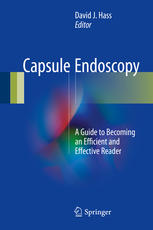

Most ebook files are in PDF format, so you can easily read them using various software such as Foxit Reader or directly on the Google Chrome browser.
Some ebook files are released by publishers in other formats such as .awz, .mobi, .epub, .fb2, etc. You may need to install specific software to read these formats on mobile/PC, such as Calibre.
Please read the tutorial at this link: https://ebookbell.com/faq
We offer FREE conversion to the popular formats you request; however, this may take some time. Therefore, right after payment, please email us, and we will try to provide the service as quickly as possible.
For some exceptional file formats or broken links (if any), please refrain from opening any disputes. Instead, email us first, and we will try to assist within a maximum of 6 hours.
EbookBell Team

4.8
104 reviewsThis volume provides a comprehensive introduction and review of small bowel capsule endoscopy (SBCE). The book reviews the data regarding appropriate indications and contraindications for the implementation of small bowel capsule endoscopy, while discussing in detail the evolving role of SBCE in the treatment of obscure gastrointestinal bleeding, and the management of inflammatory bowel disease, small bowel polyposis syndromes, and refractory malabsorption. Topics such as complications of SBCE, methods to perform SBCE on patients with dysphagia or gastric emptying pathology, and understanding the normal anatomy of the gastrointestinal tract when viewed via SBCE are also discussed. In addition, an introduction to colon capsule technology and the next generation of small bowel capsule imaging is reviewed. The text is complemented by several illustrative cases that are demonstrated with both online full length videos as well as an online interactive companion that includes review questions to reinforce concepts learned in the text.
Written by experts in the field, Capsule Endoscopy: A Guide to Becoming an Efficient and Effective Reader is an invaluable resource for novice capsule endoscopy readers, fellows in gastroenterology and hepatology, researchers, mid-level providers, residents, and medical students with an interest in learning how to implement and perform SBCE in the investigation of small bowel diseases.